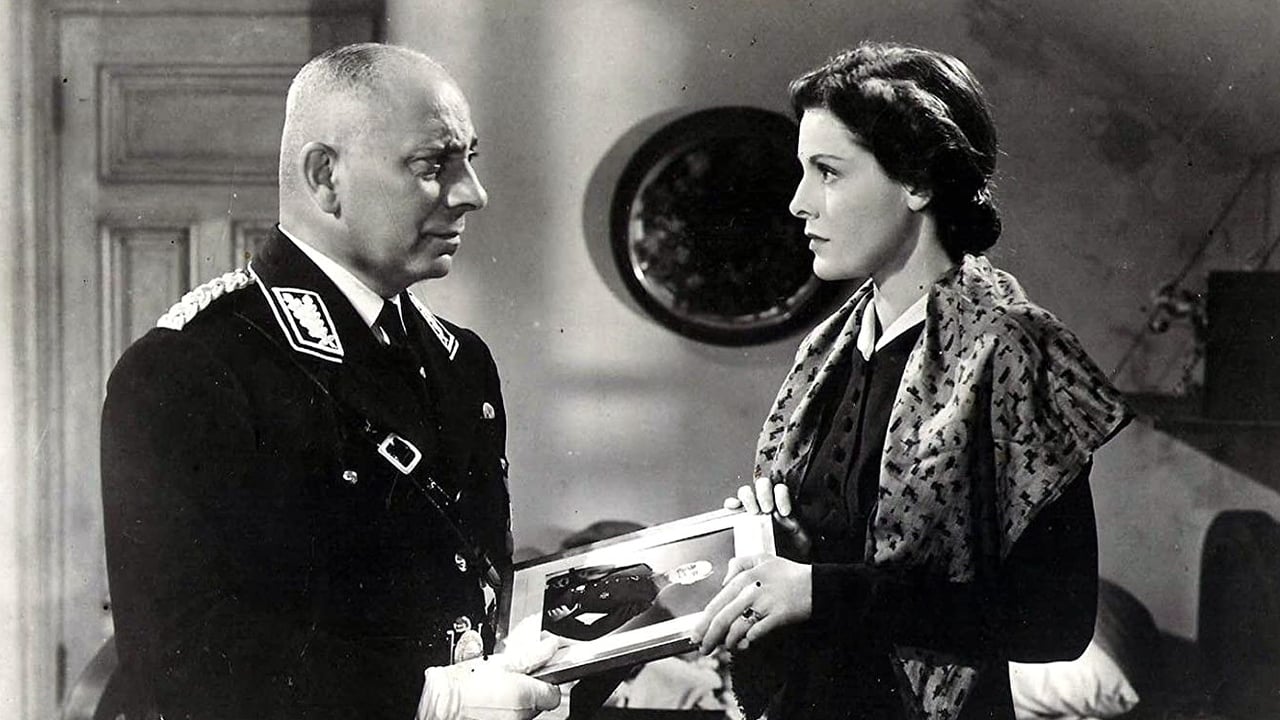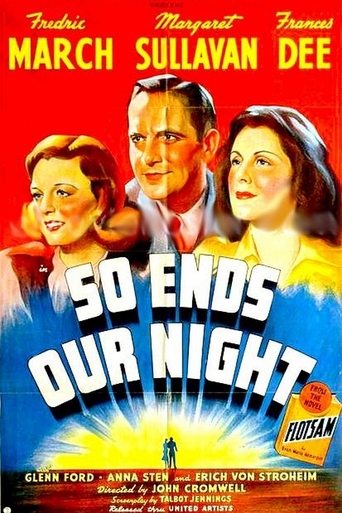

"So Ends Our Night" is an anti-Nazi film based on a novel by Erich Maria Remarque--the man whose works were banned by the Party due to his insistence in his writings (such as "All Quiet on the Western Front") that war was not at all fun but actually quite bad (imagine that!). As he himself had been forced to flee Nazi Germany, it's not at all surprising that this story is all about German expatriates who also fled the nation for their lives. The film came out 10 months before the US entered WWII and was actually among the first to be critical of the fascists. Despite the war in Europe having been raging for a year and a half, the US film industry was very slow to produce films condemning the Nazis--mostly due to stupid anti-First Amendment legislation that forced neutrality in films.The film stars three actors who didn't seem the least bit German--Frederic March, Glenn Ford and Margaret Sullavan. And so, it seemed more like three Americans trapped in Europe. However, despite being strong American accents (which is odd, as the supporting characters all have European accents), the actors did a fine job in the film and the story was compelling.As for the story, it's about three people who have fled Germany and are forced to wander about Europe, as they have no passports and are always one step away from deportation (where it would mean almost certain death). The three did not know each other until their exile but are now becoming good friends--thanks to the bind of shared misery. Again and again it looks as if one of them might somehow escape but repeatedly their efforts to legally remain outside Germany are thwarted. I was surprised, however, that March was given a much smaller role than Ford, as in 1941 Glenn Ford was definitely a newcomer and March was an established star.While this is a very good film, I couldn't help but notice that there were a few better anti-Nazi films from the same era--in particular, "Mortal Storm" (also starring Sullavan) and "Arise My Love". Still, it was quite compelling and I am sure it did a lot to solidify the American public towards the notion of one day joining in the war.
... View MoreStateless refugees from Hitler's Germany must move from one country to the next in this realistic film from 1941. The realism is in the cast of actors other than the well known Glenn Ford, Frederic March, Frances Dee, and Margaret Sullavan, those playing the smaller but important parts of spies, sympathizers, officials, restaurateurs, nurses, etc...all with a keen eye for authenticity and details. As well, one of the best parts in the film is played by Erich Von Stroheim as an intelligent, sympathetic, and cunning SS officer who's out to arrest the non-conformist played in a terrific part by Frederic March. So while we follow the main characters and a touching love story and a biting role for March, the real value of the picture is the portrait it paints in its portrayals of the other people caught up in the pre-war manoeuvrings.
... View MoreI just saw this over the weekend for the first time on DVD, though I'd seen it in college and never quite forgot it. The impact of Erich Maria Remarque's story of German refugees in Europe must've been enormous to those few who saw this sparsely distributed movie in 1940/1941.The Historical Context: This film, made prior to the American entry to the war but after the fall of France, may have helped to prepare the American public for the coming war, as in "The Mortal Storm" and "The Man I Married" and like the later movie, "Watch on the Rhine", gave the issues involved a human face, but is much more profoundly fatalistic than any of those other movies. Even at the somewhat hopeful conclusion, and especially since we view this movie today after the Holocaust was revealed, the doomed atmosphere that pervades a lot of the action is still sobering over a distance of 65 years.I couldn't help thinking that the theme of the movie is still sadly relevant throughout the world. Another interesting aspect of the film is something that I cannot answer but hope that some well informed individual might be able to help with eventually. I don't see how this movie could've gotten a production code approval. Some of the outré aspects of the story include a woman offering herself quite frankly to a March and removing her outer garments, the fact that two characters live together--in sin, as they used to say, and the fact that a sympathetic character commits suicide, an event that the film treats as an act of heroism. The print that I saw says that the movie was made by David L. Loew-Albert Lewin, Inc., and distributed theatrically by United Artists--but could movies really be distributed much of anywhere without the explicit okay of the production code at that time? I realize that Loew and Lewin had deep connections to MGM and big-time money in Hollywood and NY, but I really doubt if the filmmakers would've been willing or able to pay any of the fines that the Production Code office may have imposed for a violation of their principles.Best Aspects: I found the restrained and touching performance of Fredric March as an Aryan German who was opposed to the Nazi government to be the centerpiece of this movie, even though he's only in about half the scenes. The expression on his face in one scene in which he's trying to catch a glimpse of his wife's face in a crowd just before leaving her to go into exile is very moving. Frances Dee as the wife is very expressive in her brief, nearly silent but haunting scenes. March's resilient spirit, and his deeply effective final scene, the antics of Leonid Kinskey, and a lovely, relaxed performance from Anna Sten, add to the interest of this film for me.Good Aspects: Margaret Sullavan, whom I usually find to be a magnetic actress, seems at somewhat of a low ebb in this film. Yet, there is one vibrantly delivered speech that she gives about why she loves the puppy-like Glenn Ford that shows a flash of her ability to breath life into material. She is suddenly, for that one sequence an actress who makes the viewer understand that politics aside, its the connections of Sullavan, March, Ford and Dee to one another that keeps each of these characters tethered to their humanity despite everything that they are going through. Ford, playing a very believable teenager who is the child of an Aryan & Jewish marriage, is earnest and most affecting in his reminiscences of home and longing for a peaceful existence.Technical Aspects: The script is heavily reliant on flashbacks and narration, and at times it was a bit hard to keep track of which nation the refugees found themselves in, though overall, the strong leads and great supporting players, who also include Erich Von Stroheim, Sig Rumann, and Roman Bohnen, manage to rise above the sometimes disjointed script . The issuance of the film on DVD is welcome, but unfortunately, the picture quality of the transfer is sometimes overly bright and occasionally fuzzy, and the sound is a bit muddy at times, but it is adequate, and the good acting, compelling story and excellent direction by the underestimated John Cromwell still make it quite watchable.In general, I'd hope that others might comment on this movie, and suggest it for viewing by those interested in that period's "premature" anti-fascist films.
... View MoreNot best written (choppy) yet realistic melodrama depicting very real times during WWII. Movie is notable for Anna Sten's brief appearance (admittedly, one of my favorites) who was more or less done-in by Hollywood yet never failed to deliver superb performances. Either Glenn Ford's first or one of his first movies. Depressing yet worth seeing. Good luck, because I think I got one of the last VHS copies around.
... View More